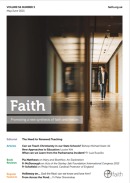The Need for Renewed Teaching
The dialogue initiating the Incarnation has a liturgical quality. The greatest event in human history began with a spoken word, opening a dialogue with Mary, who went on to listen and to make a verbal response.
There is something here of a nuptial imagery, an invitation and a response… and this goes right back to the Old Covenant and God speaking to Israel.
And the Word was made flesh, and came to dwell among us, under the beating heart of the young woman who made that response.
The Word continues to be made flesh on the altars of our churches. It is a voice, speaking the words of Christ, that brings Christ into our presence in the Eucharistic sacrifice. And we make a response. The Mass is not silent. It is a dialogue – word and response. It is a sacrifice, the ancient Temple rites renewed. It is God in dialogue with his people, Christ uniting with his Bride, the Church.
God’s dialogue with his creatures was and is central to his plan for our salvation.
In the Old Covenant, he spoke again and again to his Chosen People. Sometimes they responded well, sometimes not. Mary, the Maid of Israel, made the complete and perfect response, at the point where the Old and the New Testaments met. “Be it unto me according to your Word.”
Nuptial meaning
St John Paul spoke of the “nuptial meaning” of the Eucharist. There is much to ponder in that. A marriage involves words – solemn vows exchanged – and then these words are lived out in the flesh, bringing new life into time and eternity. Without the words, it is not a valid marriage – without the coming together, it is not valid either.
Liturgy fuses word and action: “He took bread.” Christ really did take bread in his hands, and then spoke over it, with those present hearing it: “Do this…” Word and deed – we are not a “religion of the Book” but God’s holy people, who belong to him and listen to his voice and do what he asks us to do.
St Francis of Assisi probably didn’t say “Preach always – and, sometimes, use words.” He certainly encouraged his Friars to speak, and to preach – and to call people to repentance. The priests among them were also to make themselves available as confessors. Again, the use of human speech – again a dialogue, to state sins and to speak the words of absolution.
A while back, a Bishop of a busy diocese visiting Rome for a conference, was asked by some colleagues if he intended to stay on for a further day or two but responded “No I must get back to my wife” – meaning his diocese. The Bishop was Jorge Bergoglio of Buenos Aires – now Pope Francis and his answer offered insight into the Church’s authentic understanding of episcopacy, and the nuptial message that is written into the life of the Church.
Male priesthood
As Pope, Francis has had to deal with the question that – even though it is a settled matter – continues to be asked: “Why can’t women be priests, or at least deacons?” He has reaffirmed the male only priesthood and done so with some emphasis. But he needs support. He has emphasised “On the ordination of women in the Catholic Church, the final word is clear, it was said by St. John Paul II and this remains.” Earlier this year he affirmed the authentic teaching about the threefold ordained ministry of bishop, priest and deacon, emphasising, for example that being a lector is something quite different and “fundamentally distinct from the ordained ministry that is received through the Sacrament of Holy Orders.”
He rightly sees the confusion about priesthood as being part of a wider confusion over the whole question of sexual identity. He has spoken out with some passion against the “gender ideology” that seeks to claim there are no differences between men and women, calling it “demonic.” In Amoris Laetitia he emphasised: “The young need to be helped to accept their own body as it was created… Sex education should help young people to accept their own bodies.”
Responsum from the CDF
And then there is the question of the present Western preoccupation with same-sex marriage. Thank God – we mean that literally
– for the new Responsum, with the full authority of the Pope, from the Congregation for the Doctrine of the Faith which gives a clear Negative to the question of the Church ever blessing such unions.
“It is not licit to impart a blessing on relationships, or partnerships, even stable, that involve sexual activity outside of marriage (i.e., outside the indissoluble union of a man and a woman open in itself to the transmission of life), as is the case of the unions between persons of the same sex. The presence in such relationships of positive elements, which are in themselves to be valued and appreciated, cannot justify these relationships and render them legitimate objects of an ecclesial blessing, since the positive elements exist within the context of a union not ordered to the Creator’s plan.”
“Furthermore, since blessings on persons are in relationship with the sacraments, the blessing of homosexual unions cannot be considered licit. This is because they would constitute a certain imitation or analogue of the nuptial blessing invoked on the man and woman united in the sacrament of Matrimony, while in fact ‘there are absolutely no grounds for considering homosexual unions to be in any way similar, or even remotely analogous, to God’s plan for marriage and family’.”
That last statement is a quote from Amoris Laetitia 25. The Responsum specifically footnotes Genesis: “In fact, the nuptial blessing refers back to the creation account, in which God’s blessing on man and woman is related to their fruitful union (cf. Gen 1:28) and their complementarity (cf. Gen 2:18-24).”
Full significance
With the current confusion about human identity in Western culture – “are men and women different?” “Can we ‘transition’ from one sex to another?” and so on there is an urgent need to teach the truth about human beings. Archbishop Karol Wojtyla prophetically at the Second Vatican Council described modern man as “a puzzle to himself and others”, and later, as Pope John Paul II, devoted much of his pontificate to helping untie the knots in that puzzle. We are male and female, and that has been God’s plan from the beginning.
We have not grasped the full significance of this. We are a sign – and are reminded of this at every wedding service – of Christ and his Church. And the fullness of this needs to be taught: Brid eg room and Bride a male priesthood, united to the Church. Every Mass has a nuptial significance. There is a tension today about whether or not it is morally right to discuss biological truth if there is a risk that someone might be offended. There is a growing idea that it is important to sideline or downplay facts and to emphasise instead an ideology of “gender” with penalties for those who challenge it. And all of this is against a background of adeeply wounded Western humanity: many young people have grown up with a mix of parental and semi-parental partners, have experienced the breaking up of their own and their friends’ families, have learned the need to buttress themselves against being hurt, and genuinely believe that being challenged in any discussion denies them their sense of worth.
Bridegroom and Bride
All of this points to the need for renewed teaching on this issue of Bridegroom and Bride, male and female. St John Paul’s Theology of the Body pointed the way, but All of this points to the need for renewed teaching on this issue of Bridegroom and Bride, male and female. St John Paul’s Theology of the Body pointed the way, but authentic development of doctrine requires that others take up the subject too. There is a deep truth rooted in us, written into our bodies, as male and female, echoing God’s plan from “the beginning”. The Faith Movement has long taught this, and thus has a special role to play.
Pope Francis has emphasised that grim damage is being done by the “gender ideology” that seeks to deny the truth that we are created as male and female. He has rightly highlighted the damage this is doing to marriage and to human society. More now needs to be done to expand and explore the Church’s response to what he has so rightly deplored. And in tackling this, we will see something more – an authen[1]tic development of doctrine, seeing new importance in long taught truths.






